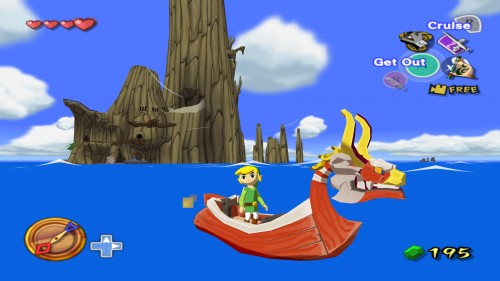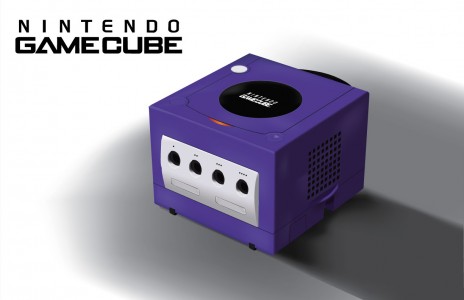It was 10 years ago on this date that Nintendo’s most neglected child was released. The Nintendo Gamecube went on the become Nintendo’s most financially unsuccessful console to date. Many contribute this lack of success to the kiddy image of the console or lack-of-innovation with hardware. Both of which definitely contributed to it’s failure to gain financial success. While the little purple box may be a failure in the eyes of many, today I will be proposing a different take on history. A history of a video-game console that marked a unprecedented changing of tides in the entire video-game industry.
The Gamecube came fresh off the heels of a wildly popular Nintendo 64 and faced the challenge of competing with the hot newcomer in The Playstation 2. While the Playstation 2, marked innovation of hardware over it’s predecessor, the Gamecube on a hardware scale was essentially a beefed up Nintendo 64. If it ain’t broke don’t fix it, right?
The Gamecube lacked innovative hardware that it’s rivals boasted, but it was still Nintendo. Surely that name alone would be enough to sell some units, right? Unfortunately the name was not enough and the console floundered. With it’s lack of a built in DVD player that it’s rivals flaunted, the Gamecube didn’t feature the extra value that it’s competition boasted.
Not only that but a lot of the people who would be potentially purchasing the console for the name alone, had grown up with Nintendo and as they grew older, the grew out of Nintendo. Instead they were now looking for a more mature way to play games. The word ‘Nintendo’ held memories of their childhood and by extention placed a veil of immaturity over the eyes of gamers across the globe. It wasn’t that Nintendo had gotten immature, it’s that we as a whole had grown older. While we had all grown, Nintendo had grown as well. With their growth came innovation, not in their hardware, but in their software.
Nintendo used the Gamecube as a launching pad for a new way of thinking. They took a look at old franchises, deconstructed them and rebuilt them in a new light. A light that had never before shined upon these Nintendo classics. Just take one look at all of Nintendo’s huge franchises and the changes that were present in their Gamecube iterations.

Metroid become an atmospheric first person shooter that made strides in advancing the genre as well as the franchise. With a focus on exploration instead of running and gunning, Metroid Prime is not only a video-game classic but it is also a monumentally ground-breaking title. Looking at Nintendo’s other franchises will also prove that this new line of thinking, for better or worse, was across the board.
Mario Sunshine entered new territory and introduced unheard of gameplay mechanics that would pave the way for future titles such as Mario Galaxy. Zelda became cell-shaded and took Link to the high seas, in what is to this day the most well-aged Zelda game as well as the title that changed perceptions of what a Zelda game could truly be. Star Fox Adventures took Fox out of the Arwing and gave the Star Fox universe life and character that it had yet to see. Smash Bros. became a hyper fast brawler the likes of which were never before seen. Even Mario’s brother Luigi became a star in his own right, with his first ever game Luigi’s Mansion.
While they took so many of their franchises to unprecedented heights, Nintendo also launched some of the most critically acclaimed franchises of all time on the little purple box that everyone forgot. With such titles as Pikmin and Animal Crossing being born on this little console that could, it is evident that during the Gamecube era, Nintendo was at an all time creative high.
It’s no secret that the Gamecube was largely the console people pushed aside for the Playstation 2 or even the Xbox. But it is undoubtable that the Gamecube featured more variety and unabashed creative flare than any other console on the market at the time. It wasn’t just Nintendo who put out inventive titles on the console. Titles such as Baten Kaitos, Eternal Darkness and Doshin the Giant, were creative masterpieces and genre defining titles.
It’s even arguable to say that multiplatform titles were better on the Gamecube, with titles like Resident Evil 4, Beyond Good and Evil and Metal Gear Solid: Twin Snakes coming to mind. It was just simply a stunning platform for gaming. A console that was not distracted by frivolous things such as a DVD/CD player, instead focusing on how to make gaming itself better.
But above all it’s achievements, the Gamecube is owed the most debt by Nintendo’s follow-up console, the Nintendo Wii. By all rights the Wii owes everything it has achieved to the Gamecube. Had it not laid the foundations, the Wii would never have seen the light of day.
With it’s lack of hardware innovation and kiddy-image the Gamecube failed to capture a wide audience. It caused Nintendo to reevaluate themselves as both a company and a developer. Through their reevaluation they concluded that their image should not be tossed aside but instead embraced, with Nintendo creating the most casually accessible console of all time in the Nintendo Wii. How did they do this? By taking the Gamecube and giving it the innovative hardware that so many wished it had and Nintendo continued to produce quality games, one after the other. The Wii has since gone on to become the best selling console of all this generation and it is all thanks to the long forgotten little purple box that made it all possible.
The legacy of the Gamecube is one that is rarely spoken about, but 10 years on, I felt it necessary to set the record straight about one of the most influential and game-changing consoles of all time. The Gamecube is never going to be one of those consoles that people look back on and remember how it took the world by storm. But for those of us who played the console and were touched by the adventures that it took us on, we will look back and remember how it took us by storm. Rest easy, my old friend and thanks for the memories.



